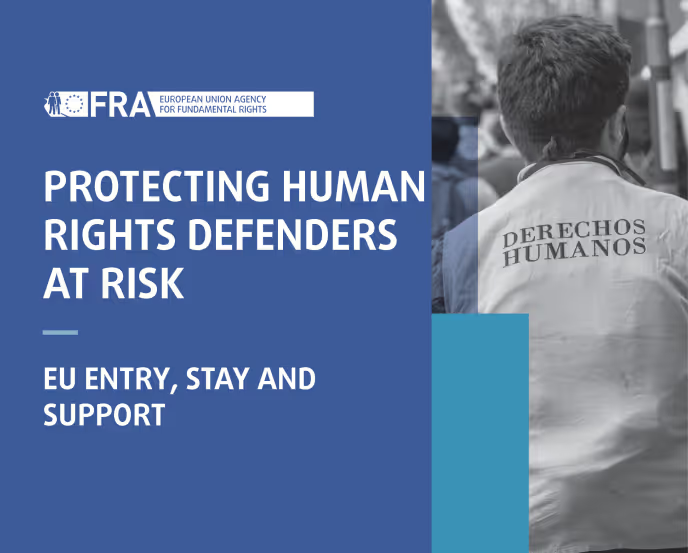European Union Agency for Fundamental Rights Report: Protecting Human Rights Defenders at Risk

A new report by the European Union (EU) Agency for Fundamental Rights (FRA) offers EU Member States useful practical tools to better supporting HRDs in need of protection.
In recent years, the world has witnessed shrinking civic space, leading to increased attacks on HRDs. While persecution can be considered a testament to the work of HRDs in protecting and promoting human rights and exposing their abuses, it has also meant that growing numbers of HRDs are facing serious threats to their life, dignity, and liberty. Since a lot of the writers, artists, and journalists with whom ICORN works are also HRDs, the ICORN Secretariat contributed to the report with information, interviews, and real-life cases.
The FRA report acknowledges the difficulties HRDs have in seeking and finding safety in the EU and identifies some of the main challenges as lack of access to information, obstacles in obtaining visas, patchy protection mechanisms, and rare opportunities for long-term stay and support in the EU. According to the FRA report, HRDs have the following mobility needs related to their work and required protection:
- The need to be protected from risks to life, physical integrity, and liberty
- The need for rest and respite
- The need for exchange and participation in international activities
- The need for a ‘just-in-case’ safety next as part of broader protection plans
Requested by the European Parliament, the FRA report shows that there is no common EU legal approach to protecting HRDs and there is a need for all EU Member States to better support HRDs. The FRA details the existing national initiatives in eight EU countries, and reports on the partial accommodation of HRDs in 18 EU Member States, primarily through civil society, academia, or city-led initiatives such as ICORN. Calling for more action and practical support for HRDs, the FRA has identified the following ways in which EU Member States can better assist HRDs seeking safety in the EU:
- Use EU law better: While the EU’s visa code allows Member States to grant visas to HRDs in need of protection, individual Member States have different approaches. The European Commission can make it easier for HRDs to apply for protection by translating and publishing the guidelines online.
- Introduce or broaden relocation programmes: EU countries could develop and expand their relocation programmes to offer effective protection. These should also extend to include the HRDs’ family members.
- Raise awareness: Visa officers and border guards need to be better informed on HRDs and how to support them.
- Consider the impact of digitalisation: EU visa processing systems should accommodate options for HRDs.
- Provide better support: EU Member States should provide more support for HRDs to be able to continue their work while in the EU. This could include housing, access to healthcare, psychological support, or a work permit.
- Review current tools: The EU should assess whether its current legal tools, such as the Visa Code or the ETIAS Regulation, effectively support HRDs, and amend them if necessary.
Reflecting on the report, its findings, and recommendations, Michael O’Flaherty, the Director of the EU FRA, said:
‘Civil society is essential to respectful societies that uphold human dignity. Yet we see worrying and growing levels of threat, intimidation, and harassment. In 2022 alone, over 400 human rights defenders were killed because of their human rights work – and this is just the number of confirmed killings. We must do better to protect those who are fighting for respect of human rights.’
ICORN welcomes the report’s recommendations for better protection of HRDs and looks forward to future cooperation with the FRA.
For questions or more information about the report, please contact the EU FRA: Email: media@fra.europa.eu; Tel.: +43 1 580 30 653.



